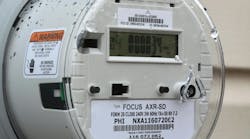Edison Electric Institute Awards Honors At its annual convention in June, Edison Electric Institute (EEI) presented honors to several utilities it considered exceptional. The international winner of the Edison Award for 1995 went to Eskom, the South African state electric utility. The domestic winner of the Edison Award was Duke Power Co., Charlotte, North Carolina, U.S. Common Goals awards were also presented to several U.S. utilities.
The Edison Award recognizes distinguished leadership, innovation and contribution, resulting in significant progress within the electricity industry for the benefit of all. EEI's Common Goals program honors the best in partnerships between electric utilities and their customers.
The judges selected Eskom as the international winner of the Edison Award for its dedication to rural and urban electrification. Eskom brought electricity to 400,000 mostly disadvantaged township households in 1995 and is committed to bringing electric service to between 300,000 and 400,000 more households each year between now and the end of the century.
The citation applauds Eskom for managing this program without financial assistance from the government and little from the company. Customers are able to buy low-cost modular "ready boards" equipped with lights and sockets. They receive electric service through prepayment meters paid for with "smart cards" which are reloaded in local shops.
Duke Power earned the 1995 award for its innovative achievements and proactive approach to the competitive electric-power marketplace. The utility's innovations during 1995 included the formation of Duke/Louis Dreyfus, a joint venture with Louis Dreyfus Electric Power to market electric power by leveraging both generating assets and trading expertise. Duke also formed DukeNet, a telecommunications affiliate that recently was part of a successful bidding consortium for FCC personal communications service licenses. The utility continued operational excellence of both nuclear and fossil-fueled generating stations and had a good financial performance as reported by Wall Street ratings agencies. Duke continued with its community partnerships in 1995. It also had a successful, ahead-of-schedule startup of the 16-unit, 1200 MW Lincoln combustion turbine project brought on-line to meet peak summer demand.
1996 Common Goals winners included Georgia Power Co., Atlanta, Georgia, U.S.; Portland General Electric Co., Portland, Oregon, U.S.; SCANA Corp., Columbia, South Carolina, U.S.; Tucson Electric Power Co., Tucson, Arizona, U.S.; and Western Resources, Inc., Topeka, Kansas, U.S.
1996 Common Goals Winners Winners of EEI's Common Goals Award were presented awards in several catagories. Following are the winners and a brief paragraph on why they won. Georgia Power Co. in the Environmental Partnerships category for its Shenandoah Environment & Education Center. The center was established in 1990 and operates in partnership with the U.S. Environmental Protection Agency, U.S. Department of Energy, National Renewable Energy Lab, Georgia Forestry Commission, Georgia Wildlife Federation and Georgia Clean and Beautiful. The center has provided more than 200,000 visitors with hands-on activities for children, environmental training for college students and professional development for teachers and other professionals. Shenandoah also provides a site for Georgia Power research in photovoltaics, electric vehicle engineering and energy management research.
Portland General Electric Co. (PGE) in the Energy Efficiency category for its Earth Smart City Life housing development, part of its long-term goal of helping Portland to deal with growth without compromising the quality of life or natural resources. PGE partnered with customers, city and community leaders, contractors, home builders and neighborhood associations and others to build model high-density inner-city housing that is attractive, comfortable and affordable, even for those of modest income, while conserving land, energy and resources. The project is a model for other city planners. PGE will build a second Earth Smart City Life project in 1997.
SCANA Corp. in the Common Goals Educational Partnerships category. In partnership with the South Carolina Department of Education and the governor's office, SCANA is committed to improving the quality of education of the adult work force and the quality of life in South Carolina through adult literacy. In 1994, SCANA introduced a mobile classroom called The Coach, which is equipped with 12 interactive computers and is staffed by literacy specialists. The Coach is made available to businesses and communities that do not have the resources or expertise to provide similar assistance. This free program has aided more than 2000 workers since its inception.
Tucson Electric Power Co. (TEP) in the Community Responsibility category for a multi-media community education program to curb driving under the influence of alcohol. TEP brought together numerous law enforcement group and other agencies and has aggressively sought to bring its message to students in schools region-wide. Since the program began, there has been a sharp decline in alcohol-related accidents, incidents arrests and fatalities in Pima County, Arizona.
Western Resources, Inc. in the Customer Satisfaction category for the work done at its Power Technology Center (PTC). Since 1992, PTC has offered a wide range of services to customers of all sizes aimed at protecting sensitive electronic equipment, digital industrial controls, medical imaging equipment, motor drives and telecommunications facilities from power quality problems. PTC has trained more than 1000 plant managers, engineers, technicians, electricians and other customers in power quality management.
Cause of Western U.S. and Canadian Blackout Determined A flashover that occurred between a 345-kV transmission line and a tree that had grown too close to the line triggered the blackout in the western part of the United States that affected more than 2 million people in eight U.S. states and two Canadian provinces, according to the team analyzing the July 2 blackout.
The finding was announced at the July 19 meeting of the Western Systems Coordinating Council (WSCC), the organization in charge of investigating the incident.
The affected line spans 234 miles (377 km) between the Jim Bridger generating plant near Rock Springs, Wyoming, U.S., and the Kinport substation in southeastern Idaho. While the flashover was the trigger for the blackout, a combination of unusual operating conditions occurred that contributed to the blackout. The conditions included a near record setting hydro generation in the Pacific Northwest, high power transfers on the transmission lines between the Pacific Northwest and California, power transfers through Idaho to Utah, and high coal-fired generation in Wyoming and Utah while the Idaho and Utah areas were experiencing record-setting demands for power.
These unusual conditions, coupled with the simultaneous loss of a parallel 345-kV line caused by a bad protective device, contributed to the severity of the outage. The chain of events leading to scattered customer interruptions over a wide geographic area took less than 35 seconds to occur. Most customers had service restored within 25 to 30 minutes.
To ensure reliable operation in the future, system operating conditions have been modified. WSCC members have lowered the amount of power being transferred over the transmission lines in the Northwest. Additional studies are being conducted to further analyze what occurred on July 2 and to evaluate power transfer limits.
Part of South Western Electricity Sold PP&L Resources, Allentown, Pennsylvania, U.S., has acquired a 25% ownership interest in South Western Electricity plc, Almondsbury, Avon, England, for US$189 million from The Southern Company, Atlanta, Georgia, U.S.
South Western Electricity is one of Britain's regional electric distribution companies. The Southern Co. had purchased South Western Electricity in September 1995. PP&L Resources, the parent company of Pennsylvania Power & Light Co., will place the investment under Power Markets Development Co., a wholly owned independent power subsidiary of PP&L Resources.
MVEA to Disband Because of the death of its executive vice president and its dwindling membership, the member companies of the Missouri Valley Electric Association (MVEA) have elected to disband the association by the end of 1996. All meetings have been canceled. The MVEA, North Kansas City, Missouri, U.S., was founded by member companies in 1929 to help members share information and to aid its members in providing the best available electric service to their customers.
With the flurry of mergers and acquisitions in the industry, the association's membership has dwindled in recent years from 16 member utilities to 11. The death of the association's executive vice president, Richard Hartley, in May left the association without a guiding force. The MVEA's executive committee said that after 62 years of operation, the organization no longer provides the value to its membership that was intended when the association was formed. The decision to disband was made in July.
NAESCO Accredits Energy Service Companies The National Association of Energy Service Companies (NAESCO) announced the first companies accredited under its newly instituted Accreditation Program. The term ESCO, or energy service companies, has been applied to all kinds of companies. The association decided to assert publicly what the industry itself believes ESCO to represent to the marketplace, according to Executive Director Terry E. Singer.
For NAESCO, an ESCO is a company with the technical and managerial competence to develop "comprehensive" energy efficiency projects. An ESCO offers a full range of energy services: energy audits; providing or arranging for project financing; design engineering; and O&M services. An ESCO also develops performance-based projects where the ESCO's compensation is contingent upon the projects realizing verified cost savings.
The inaugural 12 companies accredited by NAESCO are CES/Way International, Co-Energy Group, EUA Cogenex, Energy Master Corp., Energy Performance Services, HEC Energy Corp., Landis & Gyr Powers, NORESCO, Onsite Energy, Power Systems Solutions, Viron Energy Services and SYCOM Enterprises
Siemens Acquires Metering Systems Business Siemens Energy & Automation, Inc., Atlanta, Georgia, U.S., has acquired the electric metering systems business of Process Systems, Inc. (PSI), Charlotte, North Carolina, U.S.
As a result of the acquisition, PSI will become the Siemens "Center of Competence" for the supply of meters and metering systems to NAFTA, ANSI and select international markets, according to Siemens. PSI will be incorporated into Siemens Energy & Automation as a business unit of the company's Power Automation Division. PSI has had a technical alliance with Siemens since 1989, incorporating the Siemens' measurement chip set in its PSI QUAD4 meter products.
Regional Rodeo Winners Announced While the 13th International Lineman's Rodeo is a month away, several utilities have held their qualifying events to determine which linemen will represent them at the event in Kansas City, Missouri, U.S. on Sept. 28, 1996.
Six utilities competed at the 1996 Regional Lineman's Rodeo in Michigan in June. Detroit Edison Co., Detroit, Michigan, U.S., received the overall winner trophy while apprentices from Consumers Power Co., Jackson, Michigan, captured the top six places in their category. Two other utilities competed at the event _ Lansing Board of Water & Light, Lansing, Michigan; and PSI Energy, Inc., Plainfield, Indiana, U.S. Also competing were contracting companies Henkels & McCoy, Blue Bell, Pennsylvania, U.S., and The Gilbert Companies. Each will be sending teams to the competition.
The IES Utilities Rodeo, held June 8, included participants from IES Industries, Inc., Cedar Rapids, Iowa, U.S.; Interstate Power, Dubuque, Iowa, U.S.; and Wisconsin Power & Light, Beloit, Wisconsin, U.S. All three utilities will be sending participants to the event.
Participants will also come from outside the United States. Eastern Electricity, Suffolk, England, will send a team of four linemen to the rodeo. The four linemen beat out seven other teams at the first Eastern Electricity Power Games on June 1. The Power Games comprised seven engineering games involving overhead line and cable installation procedure skills. The eighth event was a questionnaire on engineering standards, safety and environmental policies.
Merger Approved The North Dakota Public Service Commission approved in June Northern States Power Co.'s (NSP) application to merge with Wisconsin Energy Corp., Milwaukee, Wisconsin, U.S., to form Primergy Corp.
After the merger is completed, NSP, Minneapolis, Minnesota, U.S., plans to implement an immediate retail electric rate reduction of 1.5% and a retail natural gas reduction of 1.25%.

